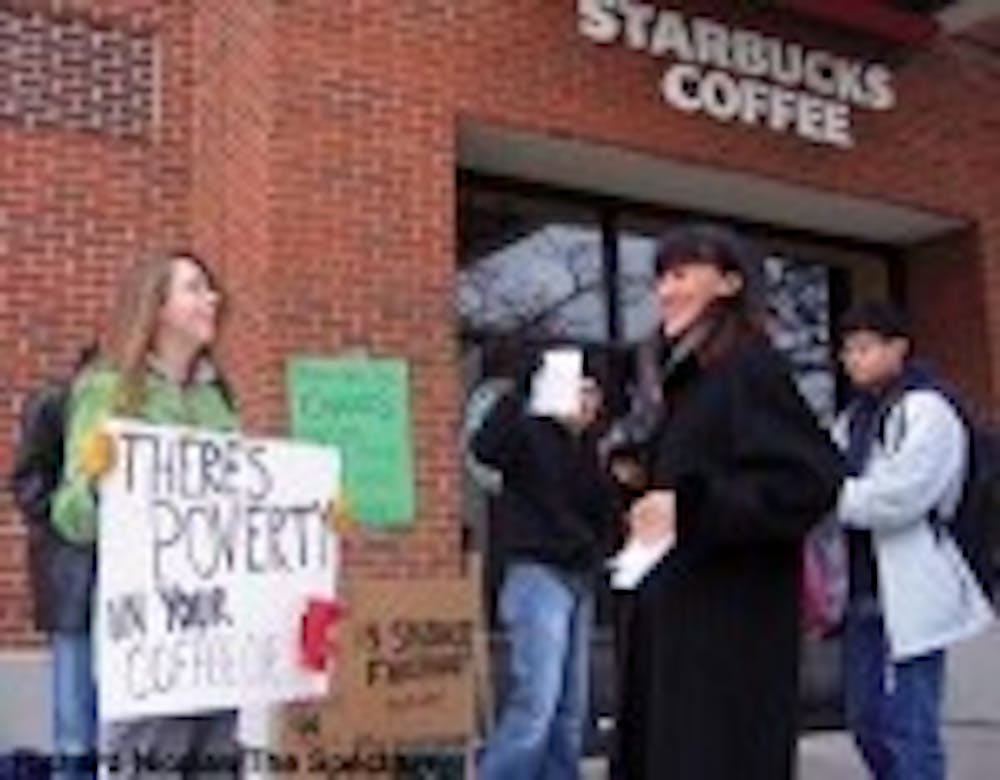Picketers braved the cold weather Friday to send a message to Starbucks: the mistreatment of coffee bean farmers will not be tolerated.
The student protesters, led by Eric Levinson, posted signs highlighting this alleged mistreatment as they stood outside of the coffee hub. According to Levinson, a freshman legal studies major, Starbucks routinely exploits the third-world farmers who supply its coffee beans.
"These farms are essentially sweatshops in the fields," he said. "American consumers can easily remedy this horrible existence by demanding that large corporations, like Starbucks, establish a fair trade price for goods like coffee and chocolate, and exclusively purchase these products at the established price."
Levinson is a local organizer for "Break the Chains," a nationwide movement sponsored by a special interest group known as Organic Consumers Association. The movement is designed to boost demand for locally grown, organic agricultural products. The organization hopes to force large retailers to reconsider their destructive corporation policies and turn toward growth that is equitable and sustainable.
The campaign hopes to spark a massive boycott of Wal-Mart and the "Big Box chains," as well as the big chain bookstores, restaurants, grocery stores and coffeehouses.
Starbucks is one of the few companies actually on college campuses than can be protested.
In a statement released Friday, Starbucks spokeswoman Heather Roberson declined to confirm or deny Levinson's charge that Starbucks is exploiting poor farmers in third world nations.
However, she did deny that her company policies are discouraging the production of environmentally friendly, organic coffee beans and milk.
"Starbucks appreciates the concerns some of our customers have about rBST," she said, referring to the traces of Bovine Growth Hormone often present in industrially produced milk. "Therefore, in all of our U.S. company-operated stores, organic milk and soy alternatives, which are guaranteed to be rBST-free, are available upon request."
Levinson said that UB students could do their part in promoting fair trade and helping to improve the lot of farmer in developing nations by "buying responsibly."
"Students should demand organic and fair trade coffee. They should choose the alternatives to send a message to Starbucks," he said.
One poster pointed out the gross social inequity that exists between the corporation and the farmers by comparing the annual earnings of Starbucks with those of the average farmer.
"In 2001, the CEO of Starbucks earned over $2 million, while the average coffee farmer will earn only $300 for their entire yearly crop," Levinson said.
He added that the profit-driven policies of Starbucks leave little room for sustainable, organic agriculture and encourages the use of hormones and chemicals.
"A majority of the products such as coffee and milk available at Starbucks are non-organic," he said. "There are very few natural, organic options available."
Levinson also emphasized that the protest is not aimed at Starbucks' treatment of its own employees, and he insisted that his group's activities were designed to benefit poor coffee growers.
"Previous grassroots efforts have compelled Starbucks to make many positive changes in how they treat their employees, in terms of a living wage and healthcare," he said. "However, there are many Starbucks employees that are not on the payroll. These employees are the farmers that produce the coffee that Starbucks sells in thousands of locations."
Roberson, the Starbucks spokeswoman, also refuted allegations made by the Organic Consumers Association that Starbucks is putting small coffee shops out of business.
"Starbucks believes there is room for many coffeehouses in the marketplace that can meet different customers' needs," she said. "Also, Starbucks currently only pours approximately seven percent of all coffee consumption in the United States."
Roberson cited a Wall Street Journal article as evidence that Starbucks helps to increase overall demand for coffee by educating average consumers. She said the rising water of market demand would float the economic fortunes of all coffee shops, large and small.





